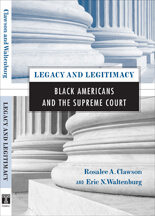
| RELATED INFO |
| * "Legacy and Legitimacy: Black Americans and the Supreme Court:" |
| * Rosalee A. Clawson |
| * Eric N. Waltenburg |

January 27, 2009
Book explores attitudes of black Americans toward Supreme Court
WEST LAFAYETTE, Ind. - |
"When the Supreme Court rules on a controversial issue, it pulls public opinion in the direction of its decision," says Rosalee A. Clawson, an associate professor of political science.
Clawson, along with Eric N. Waltenburg, an associate professor of political science, wrote "Legacy and Legitimacy: Black Americans and the Supreme Court." The book ($23.95) was published by Temple University Press in December.
"This effect, termed the 'legitimacy conferring effect,' may not completely change people's minds about an issue," Clawson says. "Often the influence is more subtle. For example, someone who was totally opposed to an issue may become more accepting because of a Supreme Court decision.
"This government branch has a unique ability to influence public opinion because it is held in such high esteem as compared to other government institutions. Its legitimacy can be attributed to the common belief that the Supreme Court is apolitical and above politics."
Clawson and Waltenburg also compared Supreme Court media coverage in the mainstream media and black news outlets.
"We found quite a bit of difference in the coverage of a controversial ruling on affirmative action," Clawson says. "The mainstream press provided apolitical coverage of issues, and the black press provided much more politicized coverage. For example, the mainstream press tends to write about the Supreme Court justices as neutral judges, whereas the black press will criticize specific judges and focus on the politics of the decision.
"This is interesting because the Supreme Court's ability to affect public opinion is influenced by this differential media coverage."
Purdue's College of Liberal Arts and the National Science Foundation funded research for the book, including its historical analysis, survey data and experiments.
Clawson also is co-author of "Public Opinion: Democratic Ideals, Democratic Practice," and Waltenburg is author of "Choosing Where to Fight: Organized Labor and the Modern Regulatory State, 1948-1987."
Writer: Amy Patterson Neubert, (765) 494-9723, apatterson@purdue.edu
Sources: Rosalee A. Clawson, (765) 494-7599, clawsonr@purdue.edu
Eric N. Waltenburg, (765) 494-6309, waltenb@purdue.edu
Purdue News Service: (765) 494-2096; purduenews@purdue.edu
To the News Service home page
